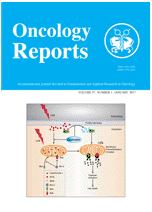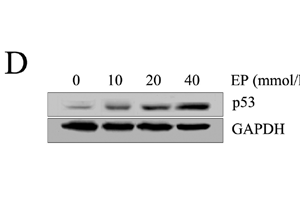 An oncology journal has decided to retract a 2012 paper on gastric cancer after discovering duplicated data in multiple figures.
An oncology journal has decided to retract a 2012 paper on gastric cancer after discovering duplicated data in multiple figures.
According to the retraction notice, the journal’s editorial board received a tip from a reader regarding the potential figure issues. Oncology Reports launched an investigation, which confirmed the allegations. The authors failed to respond to the journal’s multiple requests for more information.
Here’s the retraction notice:
Following the publication of this article, an interested reader drew to the attention of the Editorial Board that the above article appeared to contain a series of Figures that featured duplicated data. Following an internal investigation, the Editorial Board reached the conclusion that the allegations of the reader were well-founded. Specifically, the GAPDH bands shown in Figs. 2 and 3 are identical with those in Figs. 4C and 5D, with the exception that the images have been reversed. Furthermore, certain data in Fig. 4C of this paper appeared to have been shared with Fig. 3 in the following article (albeit for purportedly different experiments): Zhang J, Zhu J, Zhou Z, Chen W and Chen N: Inhibitory effects of ethyl pyruvate on invasion and metastasis of human gastric cancer SGC-7901 cells via downregulation of Akt pathway. China J Cancer Prev Treat (Chin) 39: 776-779, 2012. Despite numerous attempts at doing so, we were unable to receive any response to our request for further information from the authors of this article. Given the extent of the anomalies with the data between the aforementioned papers, the Editorial Board has therefore decided to retract the article from Oncology Reports. We regret any inconvenience in this regard. [the original article was published in the Oncology Reports 27: 1511-1519, 2012; DOI: 10.3892/or.2012.1623]
The paper, “Inhibitory effects of ethyl pyruvate administration on human gastric cancer growth via regulation of the HMGB1-RAGE and Akt pathways in vitro and in vivo,” has been cited 21 times, according to Clarivate Analytics’ Web of Science, formerly part of Thomson Reuters.
For comparison, see figures 5D (left) and 2B (right) from the paper:


We’ve reached out to the journal’s editor-in-chief Demetrios Spandidos for more information on the investigation, as well as the study’s corresponding author professor Jin-Shui Zhu, from the Sixth People’s Hospital in China, for additional insight, but have received no responses.
Zhu was the last author on a 2010 paper that was retracted in 2011. The notice – like the article, “Effects of oxymatrine injection combined with low-dose paclitaxel on mRNA and protein expressions of vascular endothelial growth factor and CXC chemokine receptor 4 in human gastric carcinoma SGC-7901 cells” in the Journal of Chinese Integrative Medicine, which is not indexed by Clarivate Analytics – is in Chinese, and not available on PubMed.
We will update the post if we learn anything new.
Like Retraction Watch? Consider making a tax-deductible contribution to support our growth. You can also follow us on Twitter, like us on Facebook, add us to your RSS reader, sign up on our homepage for an email every time there’s a new post, or subscribe to our new daily digest. Click here to review our Comments Policy. For a sneak peek at what we’re working on, click here.
The editor-in-chief, Demetrios Spandidos, was author on the first of 2 retractions at UCLA, which Retraction Watch reported on 13th Dec 2016.
http://retractionwatch.com/2016/12/13/ucla-lab-pulls-two-papers-one-author-admitted-misconduct/
I wonder if the number of retracted articles would change much if the journals all had a policy of automatically notifying the perpetrators institution and grant funding body of the retraction at the same time they inform the corresponding author?
I am guessing many of those responsible inform their department heads of the publication and then just keep silent about the retraction……
Demetrios Spandidos appears at length in this Chicago Tribune article.
http://articles.chicagotribune.com/1996-10-07/business/9610070181_1_oncogenes-natalie-angier-nobel-prize
“For a far fuller account of one of the most important intellectual adventures of recent years, let me suggest a new book, “Racing to the Beginning of the Road: The Search for the Origins of Cancer,” by Robert A. Weinberg. ”
“Weinberg provides a compelling account of the rise and fall of one Demetrios Spandidos of the University of Toronto. Spandidos was a young Canadian protege of Louis Siminovitch, the top geneticist in Canada. He electrified the cancer research community with a presentation to a Dana Farber Cancer Institute seminar in April 1978. Armed with a command of the latest techniques and an array of dazzling data, Spandidos described an extensive series of experiments that demonstrated conclusively that the root cause of cancer was not germs, not chemical carcinogens, but genes. This was not just a hunch, but rock-solid proof.
Weinberg was in the audience–his heart sinking as Spandidos soared. “I had conjured up exactly the same (experimental) strategy just eight weeks earlier. It seemed to be a sure-fire way to uncover oncogenes inside human tumors. My inspiration represented the first truly original idea of my career, holding the promise of major breakthroughs, milestone experiments that would make my name.”
But in his meticulous presentation, Spandidos demonstrated that he had proven the same idea three different ways; he had done all there was to do. “Now the ballgame was over before I could even get to bat. . . .”
Worse, Weinberg discovered, MIT soon would be preparing to make an offer to hire his rival. “I was about to be eclipsed, overshadowed in my own institution by an outsider much more competent than I was.”
There was just one problem. When a referee of Spandidos’ paper expressed astonishment at the sheer quantity of work that had been done in the previous year (and another person in his lab voiced concerns as well), Siminovitch counted the number of Petri dishes his lab had bought. He concluded they were far fewer than the number necessary to have performed the experiments Spandidos claimed had been done, asked to see the raw data (there was little)–and summarily fired his protege for cheating.”
Old Russian proverb:”Dwell on the past and you’ll lose an eye; forget the past and you’ll lose both eyes.”